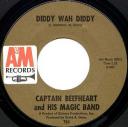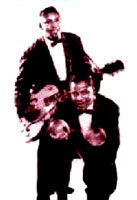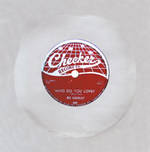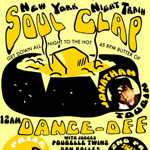Bo Diddley’s A Survivor: Rock’n’Roll Nurse Went to His Head
The bad news is that Bo Diddley had a stroke last week following an Omaha, Nebraska concert. The good news is that he’s alive and doctors yesterday said he’s rapidly improving. Despite some left brain damage effecting his speech and speech recognition, he’s already up and around and able to sing and play guitar. If you’d like to send the Originator get-well wishes, contact:
postmaster@tciartists.com
Since hearing the news on Thursday, I’ve had his tunes in regular rotation at home – which is not much of a change from the norm as I’ve been drinking deeply and regularly from his vast well of killer sides during my DJ sets for months now. With his extensive catalog of jumpin’ tunes, wide vocabulary of beats, and the inimitable tremolo guitar and maraca vibration of his sound, nobody can keep a party going like Mr. Diddley.
Sometimes we forget to revisit our more obvious music legends whose work begs for reevaluation – particularly in terms of how they sound and what they mean in our current sonic and cultural context. We particularly miss out in the case of Bo Diddley because he’s far too prolific to be remembered merely on the basis of either his first two albums or a handful of standards. While the indie rock publications are gonna tell you to revisit Daydream Nation or Spiderland this summer (mark my words), I’d like to go out on a limb and suggest that you also spend your sweaty season getting reacquainted with one of the 20th Century’s wildest, weirdest, and, what the heck, best sounds.
 The usual take on Bo Diddley is that he had an important first single, “Hey Bo Diddleyâ€/â€I’m a Man†(1955) and an extremely prolific period up to 1963 and was washed up for good by the time the British invasion brought his sound back into mass consciousness. Like any unique and successful 1950s blues-based black electric musician that suburban teens and, later, famous British rock stars dug, he’s disproportionately spoken of in terms of how he figures into the evolution of rock’n’roll. This practice reinforces the canonization of 1960s celebrity bands like the Beetles, the Stones, and the Beach Boys at the expense of the serious consideration of vital and contemporary musicians of the 1950s – most of whom were still prolific long after the red coats arrived. Historically relegated to the ghetto of prehistory, the Bo Diddleys, Chuck Berrys, Muddy Waters, Howlin’ Wolfs. etc. assume the role of missing links in the evolutionary chain that leads to the pinacle of 1960s pop. This process at best pigeonholes these artists as merely naive but naturally tallented victims of white musical theft – neither capable of translating their work to European fine art nor American financial success. At worst they become primatives only useful in a historical context.
The usual take on Bo Diddley is that he had an important first single, “Hey Bo Diddleyâ€/â€I’m a Man†(1955) and an extremely prolific period up to 1963 and was washed up for good by the time the British invasion brought his sound back into mass consciousness. Like any unique and successful 1950s blues-based black electric musician that suburban teens and, later, famous British rock stars dug, he’s disproportionately spoken of in terms of how he figures into the evolution of rock’n’roll. This practice reinforces the canonization of 1960s celebrity bands like the Beetles, the Stones, and the Beach Boys at the expense of the serious consideration of vital and contemporary musicians of the 1950s – most of whom were still prolific long after the red coats arrived. Historically relegated to the ghetto of prehistory, the Bo Diddleys, Chuck Berrys, Muddy Waters, Howlin’ Wolfs. etc. assume the role of missing links in the evolutionary chain that leads to the pinacle of 1960s pop. This process at best pigeonholes these artists as merely naive but naturally tallented victims of white musical theft – neither capable of translating their work to European fine art nor American financial success. At worst they become primatives only useful in a historical context.
 It would however be irresponsible to neglect how Bo Diddley figures into general scheme of things when discussing his very significant art. His hits were initially covered by everyone from early rock’n’roll practitioners like Buddy Holly, blues giants like Muddy Waters, and, later, by British Invasion bands (not only did Pretty Things took their name from “Pretty Thing,†but the Stones, the Who, the Kinks, the Animals, the Yardbirds, the Troggs, Moody Blues, the Zombies, all of ‘em, cut their teeth playing and recording Bo Diddley songs), plus psychedelic rockers like Hendrix, the Doors, the Grateful Dead, and Quicksilver Messenger Service, garage rockers like Shadows of the Knight, Flaming Groovies, and, later, every Billy Childish project, hard rockers like Aerosmith, Humble Pie, and UFO, guitar gods Jeff Beck, Peter Green, and Eric Clapton, and the entire evolution from Ronnie Hawkins and the Hawks to the Band. What’s commonly referred to in music-speak as the “’Bo Diddley’ Beat†(duh-duh-duh duh-duh) was appropriated in everything from 1950s rock’n’roll hits like “Not Fade Away†or the super-rip-off “Willie and the Handjive†through “Magic Bus†through The Stooges’ “1969†to new wave ones like Bow Wow Wow’s 1982 cover of the Strangelove’s “I Want Candy,†etc. And, for our self-centered purposes, not only did the likes of MC5, Patti Smith, and Gun Club interpret the Originator, but its never mentioned that “Diddy Wah Diddy†moved through our countercultural lineage as the first single of both Captain Beefheart and the Magic Band and, fifteen years later, Lydia Lunch’s finest project, 8-Eyed Spy. And, yes, if you attempt to imagine the thousands of branches growing only from these few examples, there’s no way you won’t get lost trying to fathom the fertile imprint of Mr. Diddley’s first and second-generation DNA on contemporary music.
It would however be irresponsible to neglect how Bo Diddley figures into general scheme of things when discussing his very significant art. His hits were initially covered by everyone from early rock’n’roll practitioners like Buddy Holly, blues giants like Muddy Waters, and, later, by British Invasion bands (not only did Pretty Things took their name from “Pretty Thing,†but the Stones, the Who, the Kinks, the Animals, the Yardbirds, the Troggs, Moody Blues, the Zombies, all of ‘em, cut their teeth playing and recording Bo Diddley songs), plus psychedelic rockers like Hendrix, the Doors, the Grateful Dead, and Quicksilver Messenger Service, garage rockers like Shadows of the Knight, Flaming Groovies, and, later, every Billy Childish project, hard rockers like Aerosmith, Humble Pie, and UFO, guitar gods Jeff Beck, Peter Green, and Eric Clapton, and the entire evolution from Ronnie Hawkins and the Hawks to the Band. What’s commonly referred to in music-speak as the “’Bo Diddley’ Beat†(duh-duh-duh duh-duh) was appropriated in everything from 1950s rock’n’roll hits like “Not Fade Away†or the super-rip-off “Willie and the Handjive†through “Magic Bus†through The Stooges’ “1969†to new wave ones like Bow Wow Wow’s 1982 cover of the Strangelove’s “I Want Candy,†etc. And, for our self-centered purposes, not only did the likes of MC5, Patti Smith, and Gun Club interpret the Originator, but its never mentioned that “Diddy Wah Diddy†moved through our countercultural lineage as the first single of both Captain Beefheart and the Magic Band and, fifteen years later, Lydia Lunch’s finest project, 8-Eyed Spy. And, yes, if you attempt to imagine the thousands of branches growing only from these few examples, there’s no way you won’t get lost trying to fathom the fertile imprint of Mr. Diddley’s first and second-generation DNA on contemporary music.
 And nobody, not even Bo Jackson, knows Bo Diddley like Bo Diddley. For someone whose music had enough substance to lend itself to constant reinterpretation, Bo was above all an inimitable stylist. His initial sound, as remarkably distinct as contemporaries like Chuck Berry or Elvis or Little Richard, had more trademark elements than any of the first generation of rock’n’rollers: his rippling ocean of tremolo-drenched tone, kinetic pre-funk guitar style, relaxed baritone, call-and-response gospel chants and choruses, and Jerome Green’s maracas. While Diddley, working his muted fretboard and strings into drum-like polyrhythms, remains one of the finest rhythm players that ever existed, the elaborate texture of his signature songs, particularly in Green’s pan-African-diaspora percussion, is perhaps the key factor in keeping his recordings more contemporary than his contemporaries. It’s also important to recognize that Diddley, much more than a one-beat pony, worked with a greater variation of rhythms than any other figure in the rock’n’roll era – from rolling four-on-the-floor rockers to shuffles to heavy blooze stomps to funky groovers to a variety of Latin and Caribbean dances. The sonic stylization was matched by his cocky persona, eccentric stage moves, red rectangular custom electric guitar, and flashy, often red plaid, sport coats.
And nobody, not even Bo Jackson, knows Bo Diddley like Bo Diddley. For someone whose music had enough substance to lend itself to constant reinterpretation, Bo was above all an inimitable stylist. His initial sound, as remarkably distinct as contemporaries like Chuck Berry or Elvis or Little Richard, had more trademark elements than any of the first generation of rock’n’rollers: his rippling ocean of tremolo-drenched tone, kinetic pre-funk guitar style, relaxed baritone, call-and-response gospel chants and choruses, and Jerome Green’s maracas. While Diddley, working his muted fretboard and strings into drum-like polyrhythms, remains one of the finest rhythm players that ever existed, the elaborate texture of his signature songs, particularly in Green’s pan-African-diaspora percussion, is perhaps the key factor in keeping his recordings more contemporary than his contemporaries. It’s also important to recognize that Diddley, much more than a one-beat pony, worked with a greater variation of rhythms than any other figure in the rock’n’roll era – from rolling four-on-the-floor rockers to shuffles to heavy blooze stomps to funky groovers to a variety of Latin and Caribbean dances. The sonic stylization was matched by his cocky persona, eccentric stage moves, red rectangular custom electric guitar, and flashy, often red plaid, sport coats.
 Bo Diddley and his music have so many fine attributes that his songwriting typically winds up overlooked. But look at “Who Do You Love†forchristsakes! (proceed to the end for the lyrics). The lyric possesses so much astounding imagery and wit that a top-notch singer/songwriter like Townes Van Zandt took regular stabs at the it live and in the studio. And the words to “Pills,†from The Originator (1966), fit the New York Dolls’ aesthetic so skin tight that most folks assume it’s one of their own. And, you don’t have to listen too closely to “Who Do You Love”‘s flipside, “I’m Bad,†the 1956 self-mocking sequel to “I’m a Man,†to crack the reference code for Iggy’s “1969†(“Remember when I was 21/That was a year baby that I had lots of fun/But a Year has gone by I’m now 22/I can eat nails baby and drink gunpowder tooâ€). As much as Willie Dixon, who provided the guitarist with “Pretty Thing,†“Diddy Wah Diddy,†and “You Can’t Judge a Book By It’s Cover,†Bo Diddley deserves a place in the pantheon of great American poets.
Bo Diddley and his music have so many fine attributes that his songwriting typically winds up overlooked. But look at “Who Do You Love†forchristsakes! (proceed to the end for the lyrics). The lyric possesses so much astounding imagery and wit that a top-notch singer/songwriter like Townes Van Zandt took regular stabs at the it live and in the studio. And the words to “Pills,†from The Originator (1966), fit the New York Dolls’ aesthetic so skin tight that most folks assume it’s one of their own. And, you don’t have to listen too closely to “Who Do You Love”‘s flipside, “I’m Bad,†the 1956 self-mocking sequel to “I’m a Man,†to crack the reference code for Iggy’s “1969†(“Remember when I was 21/That was a year baby that I had lots of fun/But a Year has gone by I’m now 22/I can eat nails baby and drink gunpowder tooâ€). As much as Willie Dixon, who provided the guitarist with “Pretty Thing,†“Diddy Wah Diddy,†and “You Can’t Judge a Book By It’s Cover,†Bo Diddley deserves a place in the pantheon of great American poets.
Stay tuned for Bo Diddley, Part 2, where we’ll take a look at his life and recordings…
Who Do You Love (1956)
I walk 47 miles of barbed wire,
I use a cobra-snake for a necktie,
I got a brand new house on the roadside,
Made from rattlesnake hide,
I got a brand new chimney made on top,
Made out of a human skull,
Now come on take a walk with me, Arlene,
And tell me, who do you love?
Tombstone hand and a graveyard mind,
Just 22 and I don’t mind dying.
Who do you love?
I rode around the town, use a rattlesnake whip,
Take it easy Arlene, don’t give me no lip,
Who do you love?
Night was dark, but the sky was blue,
Down the alley, the ice-wagon flew,
Heard a bump, and somebody screamed,
You should have heard just what I seen.
Who do you love?
Arlene took me by my hand,
And she said ooowee Bo, you know I understand.
Who do you love?
Pills (1966)
While I was lyin’ in a hospital bed
A rock’n’roll nurse went to my head
She says, hold ya arm, stick out ya tongue
I gots some pills, boy, I’m gonna give you one
She went to my head, to my head
While I was lyin’ in a hospital bed
She gave me pills for my toes, but they didn’t ache
She gave me pills for my love, but a little to late
She gave me pills for my heart, to put me at ease
The rock’n’roll nurse shook me down to my knees
She went to my head, to my head
While I was lyin in a hospital bed
Nursey nursey, Can’t you see
I don’t need the jive you’re givin’ me
Gimme a pill, gimme a shot
Got me wonderin’ what it is I got
She went to my head,
As I was lyin in a hospital bed
Doctor doctor, run here and see
I don’t dig the jive this nurse givin’ me
She give me a shot, she give me a pill
I’m takin’ this junk, against my will




